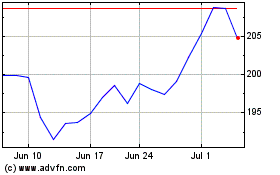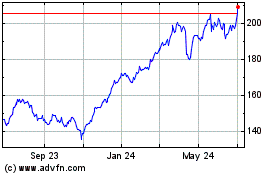J.P. Morgan Scours Europe for Best Post-Brexit Home
March 29 2017 - 5:59AM
Dow Jones News
By Max Colchester
LONDON -- A group of 75 J.P. Morgan Chase & Co. staff spent
the last nine months evaluating European cities on factors ranging
from employment law to the frequency of flight delays at local
airports.
They are picking the bank's new homes after Britain's exit from
the European Union.
The bank is checking out as many as eight cities including
Paris, Frankfurt, Luxembourg and Dublin, people familiar with the
plans say. Its staffers have begun pulling together paperwork to
apply for licenses. It has scouted for real estate in locations
including Dublin and Frankfurt. A final decision on its Brexit
plans will be made in the coming months.
J.P. Morgan is a U.S. giant, but it employs 16,000 people in the
U.K., and in 2015 a third of its $33.5 billion of
investment-banking revenue came from Europe, the Middle East and
Africa. That makes it Europe's largest investment bank and one of
the most prominent among scores of foreign lenders trying to figure
out their post-Brexit futures.
On Wednesday, British Prime Minister Theresa May is expected to
officially declare the U.K.'s intention to quit the EU, touching
off fraught negotiations with Brussels. London's banking industry
will be a key sticking point.
Like its American peers, J.P. Morgan concentrated much of its
European corporate and investment-banking activities in London. A
cluster of British legal entities also handles its clients in Asia
and Latin America, and a sprawling back-office operation in the
English seaside town of Bournemouth helps process transactions for
its global clients.
For its European clients, that compact setup may not function
after Brexit. Under current EU rules, J.P. Morgan can sell products
to European clients from London and set up a network of branches
across the continent. But after Brexit that will probably no longer
be the case. J.P. Morgan Chief Executive Jamie Dimon has said up to
a quarter of J.P. Morgan's staff in the U.K. may have to move.
Fixing for Brexit isn't easy. Maintaining an office on the
Continent isn't enough to insulate the bank from Brexit's effects.
For instance, J.P. Morgan has operated a fancy office on Paris's
Place Vendome for over a century. But that Paris office is only a
branch, or outpost, of its U.S. business. If J.P. Morgan decides to
turn Paris into a hub that can sell products across the whole of
Europe, it has a choice. It can either connect the Paris branch to
another European subsidiary or get regulatory clearance to
transform it into a subsidiary and pump in capital.
Currently, J.P. Morgan has three European subsidiaries with
banking licenses: a bank in Dublin, one in Luxembourg and a
Frankfurt-based investment bank which handles some of the lender's
euro clearing operations. It also has branches in several major
European cities including Amsterdam, Milan and Brussels.
The bank's executives are still deciding which operating model
to use. Given the uncertainty around Brexit negotiations, the bank
is hedging its bets and considering plans to scale up both branches
and subsidiaries, according to people familiar with the plan.
Each venue has distinct pros and cons. The bank's Frankfurt
office, for instance, doesn't have the infrastructure to host a
major trading platform. Space in existing offices might be tight;
the unit already houses around 450 employees. There are also
external factors to consider. Germany will hold elections later
this year featuring candidates with varying views on business. The
bank also has to make sure there is enough space in schools for its
staff's children. On the plus side, Frankfurt is home to the
European Central Bank and near some big German corporate
clients.
Once the divorce talks begin, banks will embark on a balancing
act. The longer they wait to adjust operations, the more clarity
they will have regarding the Brexit deal the U.K. may get. But if
they wait too long, they may not have enough time to implement
changes before the two-year negotiations finish.
"It's complex and there is no easy solution to this," said Joe
Cassidy, a partner at consultancy KPMG. Closely watched factors
include upcoming French elections and whether the EU allows the
U.K. to gradually transition out of the trading bloc, Mr. Cassidy
said.
Each U.S. bank is different, but their plans share common
themes: to build on infrastructure in existing offices across
Europe, keep as much as possible in London and see what happens,
executives say.
Goldman Sachs Group Inc., which already has a banking license in
Frankfurt, is upgrading infrastructure in several European cities
and is preparing to shift hundreds of staff, Richard Gnodde, a vice
chairman at the bank, said recently. Morgan Stanley favors Dublin
as its main European subsidiary but is considering Paris and
Frankfurt as secondary options, according to people familiar with
the plan. At Citigroup Inc., executives have a spreadsheet rating
cities on 26 factors as it decides where to shift a chunk of its
London-based investment bank, according to executives. These banks
are hoping to initially only need to move hundreds of jobs each,
executives say.
Once new sites are selected, applying for new banking licenses
could take up to a year. In J.P. Morgan's case, any decision to
shift capital and expertise from its U.K. subsidiary into a
European unit then requires sign off from multiple regulators
including the U.S. Federal Reserve, Britain's Prudential Regulation
Authority and the European Central Bank. European client contracts
would then have to be rewritten out of that new entity. Staff would
have to be gradually hired or moved into European locations.
Write to Max Colchester at max.colchester@wsj.com
(END) Dow Jones Newswires
March 29, 2017 05:44 ET (09:44 GMT)
Copyright (c) 2017 Dow Jones & Company, Inc.
JP Morgan Chase (NYSE:JPM)
Historical Stock Chart
From Mar 2024 to Apr 2024

JP Morgan Chase (NYSE:JPM)
Historical Stock Chart
From Apr 2023 to Apr 2024
